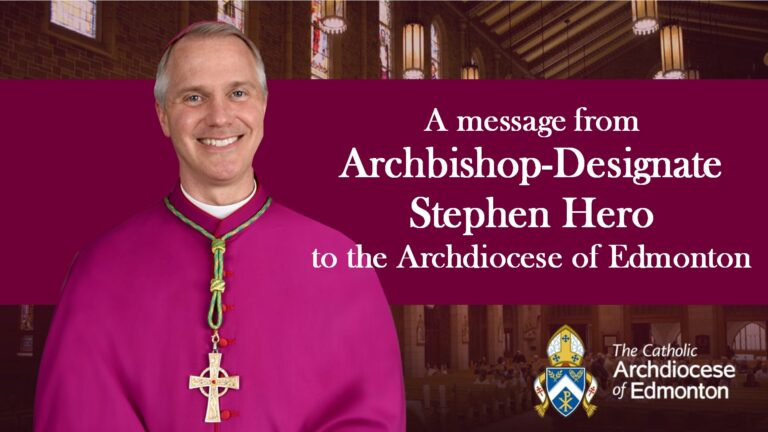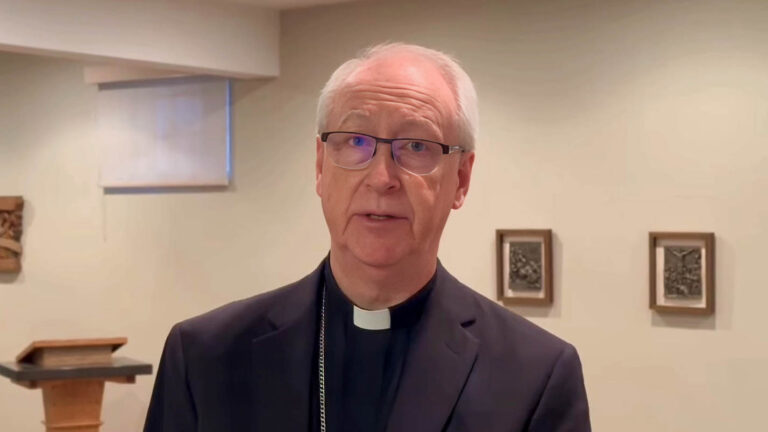Homily
[Isaiah 35:4-7; Psalm 146; James 2:1-5; Mark 7:31-37]
One of the great blessings of my life as both Bishop and priest has been ministry with the deaf community. Spending time with persons who are unable either to hear or speak has taught me many important lessons. I recall this because what I have learned from them can help us enter the Gospel text, which speaks of Jesus healing a person who is deaf and living with a speech impediment.
The healing of the deaf man is not simply an account from the past; it also signals that Jesus wants to heal our deafness and cure our incapacity for speech. In the context of the scriptural texts, the precise question for each of us to engage is this: have I become deaf to the Word of God, and unable to speak of Jesus before others? In the light of the prophecy of Isaiah, we realize that this is a spiritual malady far worse than any physical limitation.
As we hear in the first reading, the prophet indicates the signs that will herald the arrival of the long-awaited Messiah: “Then the eyes of the blind shall be opened, and the ears of the deaf unstopped; then the lame shall leap like a deer, and the tongue of the mute sing for joy.” With the healing of the man who is deaf and mute, then, Jesus is making known that he is the long-desired Messiah, the one anointed by God to usher in the kingdom of God. On his every word hinges our life and destiny. His is the voice, therefore, to which we must listen carefully, with great attention, without ever growing deaf to it.
Here is where the experience of people who are physically deaf can be of great assistance to us. The deaf inhabit a world of silence. They cannot hear sound. Many might think of this in terms of handicap, and of course, this condition does bring with it a degree of suffering and sadness. Yet, the deaf will also speak of silence as blessing, especially with respect to the Christian life centered upon listening to the voice of Jesus. In this respect, their experience points to a real handicap, a hearing deficit, from which much of the world is presently suffering.
Silence has become strangely and tragically absent in the life of Western society. Ours is a world of noise, of babble. We suffer from an endless variety of messages and images that crowd our minds and fracture our attention. We seem unable to live without the accompaniment of television, radio, Internet, videogames, playlists, an endless variety of sounds often reaching us through smartphones and headphones. Most of the noise washing over us seeks to move us away from fidelity to God’s Word. In this sense it is seriously deafening us, leaving us unable really to hear the one voice that truly matters, that of Jesus Christ.
Moreover, the noise keeps us from speaking about Jesus to others. We know we are called to announce what God has revealed in Christ, the Word made flesh. Yet this cannot happen in any convincing way if we are not constantly listening, in the silence of our hearts, to the voice of the Lord. If the deaf cannot speak, it is precisely because they cannot hear. One has great difficulty forming a sound one has not heard. Similarly, anyone who is deaf to the Word of God cannot possibly speak it to others. Living in a world of noise, we must be always cultivating, with the help of God\’s grace, that still centre in which we are disposed to hear and be transformed by the Word of God. Only thus can we articulate it before others with clarity and conviction.
I have also learned from my accompaniment of deaf people that communication happens in more ways than via speech. It also occurs, and often more effectively, by the use of signs. Through the use of sign language, the intention of the mind or heart is conveyed in symbols formed by gestures with one’s hands.
This points to another dimension of our need for healing from Jesus. When I was learning sign language, many were the occasions, let me tell you, when I caused great confusion. This happened whenever the sign I formed with my hands had a meaning entirely different from the idea I was trying to convey. This invariably led to peals of laughter among my deaf friends. In the second reading, Saint James reminds us that the same mistake can befall each of us, yet it in a way that is no laughing matter.
Our profession of faith in Jesus Christ takes the form of both the words we speak with our lips and the signs we form by our way of life. In his letter, James warns the early Christians of the confusing message they are sending by professing faith in word yet demonstrating a contrary sign by playing favourites in the Church. We do the same, whenever our behaviour patterns are inconsistent with the Gospel. Lack of coherence between word and sign renders us effectively mute, unable to give credible witness to Jesus before our world.
In this mass, then, let us pray for healing. May the Lord say to our own ears “Ephphatha! Be opened!” so that we are no longer deaf in any way to his life-saving Word. May his loving mercy also touch and loosen our tongues, and give Gospel coherence to our actions, and thus make us able credibly and joyfully to proclaim Jesus as Saviour of the world.
Most Reverend Richard W. Smith
Saint Joseph Basilica
September 8th, 2024


